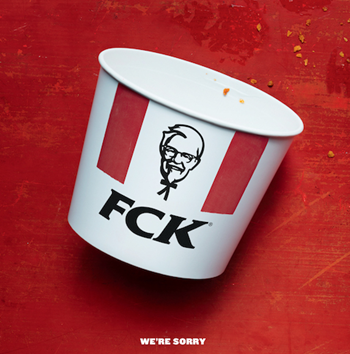In 2018, KFC delivered a crisis comeback in the face of a chicken shortage that disappointed and frustrated many customers. May seem like a minor issue, but it was a significant setback for a fast-food chain that relies heavily on a single product. The situation quickly became a public relations nightmare, but KFC turned things around by implementing an effective crisis management communications strategy.
The crisis began when KFC switched its delivery contract from a long-time partner, Bidvest Logistics, to DHL. Unfortunately, DHL experienced logistical issues with their new delivery system, ultimately leading to a chicken shortage at many KFC locations across the UK. Unsurprisingly caused a public outcry, with customers taking to social media to voice their frustration and even mocking the company with the hashtag #KFCcrisis.
Recognising the severity of the situation, KFC swiftly implemented a crisis management strategy that proved effective and efficient. They understood the importance of clear and consistent communication during times of crisis, and they utilised multiple channels to connect with their customers. Through social media platforms, their official website, and email, KFC kept their customers informed about the situation, offering updates and apologising for the inconvenience caused.
Acknowledging the shortage’s impact on their customers, KFC took steps to rectify the situation. They extended a genuine apology and even offered free food vouchers to customers who were directly affected by the shortage. This gesture not only demonstrated their commitment to customer satisfaction but also served as a way to restore trust and rebuild the brand’s reputation.
In addition to their external communication efforts, KFC worked diligently behind the scenes to address the root cause of the crisis. They swiftly switched back to their previous logistics partner, Bidvest Logistics, and implemented new measures to ensure that such a crisis would not occur again. KFC also took the initiative to address the issue with their suppliers and distribution networks, strengthening these relationships and preventing similar problems from arising.
What truly set KFC’s crisis communication strategy apart was its ability to maintain the same tone used in its previous marketing campaigns. They approached the situation with humility and self-awareness instead of adopting a defensive or dismissive stance. KFC released a humorous apology ad in newspapers featuring an empty KFC bucket with the letters rearranged to spell “FCK,” which acknowledged their mistake and allowed them to connect with their audience on a more personal level. This clever advertisement showcased their ability to turn a crisis into a moment of humour and self-deprecation and demonstrated their commitment to transparency.

The response to KFC’s crisis management strategy was overwhelmingly positive. Customers and the media praised the company’s ability to handle the situation skillfully and professionally. KFC restored customer trust and loyalty by communicating with stakeholders in a transparent and timely manner, acknowledging their mistakes, and taking concrete steps to rectify the situation. The crisis became an opportunity for KFC to showcase their ability to navigate difficult situations and maintain a positive brand image.
The KFC chicken shortage 2018 demonstrates the importance of effective crisis management and the power of communication in times of crisis. It highlights the value of a crisis management plan with an established crisis communication strategy. By responding swiftly, maintaining transparency, and taking meaningful actions to address the issue, companies can minimise the damage caused by a crisis and use it to strengthen relationships with their customers and stakeholders.